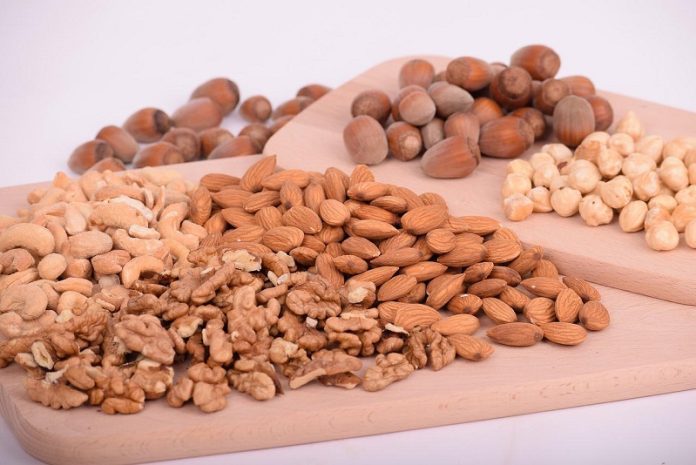
Scientists from the University of Toronto found that using nuts to replace carbohydrates in diet could help control blood sugar in type 2 diabetes.
A nut is a simple dry fruit consisting of one or two edible kernels inside a hard shell.
Common nuts include almonds, Brazil nuts, cashew nuts, hazelnuts, pecans, pine nuts, pistachios, walnuts, and peanuts.
Previous research has found that making nuts a regular part of a healthy diet helps to regulate our weight, and can protect against chronic diseases.
In the study, the team examined the effect of replacing carbohydrates with mixed nuts, as a source of unsaturated fat, on heart disease risk and blood sugar in type 2 diabetes.
The team also checked how nut consumption affects blood clotting and LDL cholesterol (‘bad’ cholesterol).
They tested a total of 117 older men and women with type 2 diabetes who were taking oral glucose-lowering drugs.
These people were assigned to one of three diets for 3 months:
In a ‘full-dose nut diet’, they ate a diet with mixed nuts (75 g/day);
In a ‘full-dose muffin diet’, they ate a diet with three whole-wheat muffins (188 g/day), with a similar protein content to the nuts, and the same carbohydrate-derived energy content as the monounsaturated fatty acid-derived energy content in the nuts;
In a ‘half-dose nut diet’, they ate a diet half portion of both the nuts and muffins.
The team found that compared with the full-dose muffin diet, the full-dose nut diet provided greater total energy intake from monounsaturated fat.
The full-dose nut diet also reduced blood sugar compared with the full-dose muffin diet.
The team also found that the cholesterol levels in LDL particles were also strongly decreased after the full-dose nut diet compared with the full-dose muffin diet.
The full-dose nut diet is predicted to reduce blood sugar, cholesterol, LDL cholesterol, and non-HDL-cholesterol.
There were no serious study-related adverse events occurred, but one participant on the half-dose nut diet was hospitalized for a heart rhythm problem after shoveling snow.
Based on the findings, the team concluded that nut intake as a replacement for carbohydrates improves blood sugar control and cholesterol levels in people with type 2 diabetes.
One limitation of the study is that various types of nuts may provide different benefits to people with type 2 diabetes.
For example, almonds are known for being the nut highest in calcium and contain many other vitamins and minerals.
Pecans contain dietary fiber, which is great for digestion because fiber helps the body cleanse itself of toxins.
Macadamia nuts are high in healthy monounsaturated fat, they may help maintain balanced cholesterol levels.
Walnuts are the nut highest in alpha-linolenic acid, an omega-3 essential fatty acid, which is great for the heart.
Future work needs to examine if these different types of nuts could benefit people with diabetes in different ways.
The research is published in Diabetologia and was conducted by David J A Jenkins et al.
Copyright © 2022 Scientific Diet. All rights reserved.





